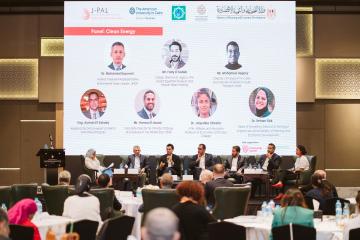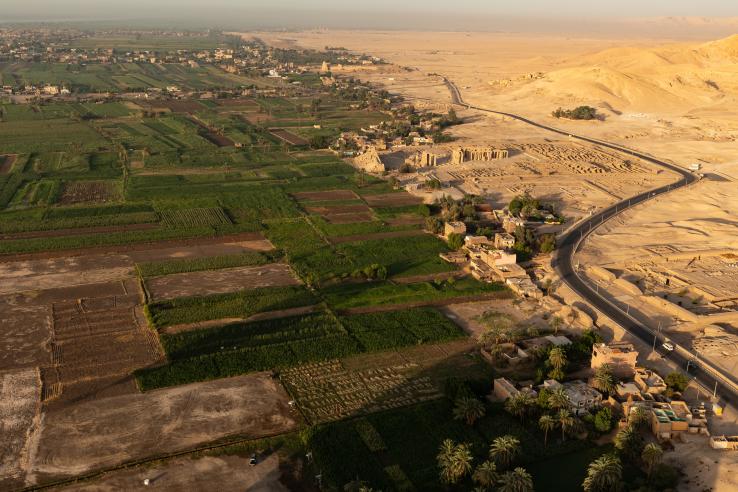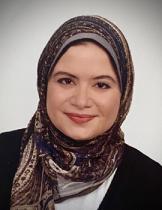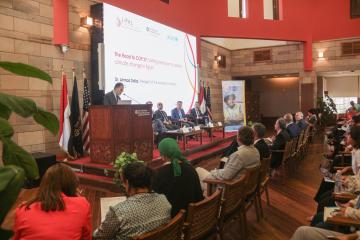
Navigating climate justice in MENA: Emerging carbon markets

In 2023, the value of tradable permits for global carbon markets reached a record 949 billion USD. Carbon markets are rapidly being developed by multiple countries, including those in the Middle East North Africa (MENA). While these markets aim to reduce emissions and enhance corporate action, rigorous impact evaluation and evidence-use is needed to ensure that the design and implementation of these markets focuses on equitable and effective climate action.
Carbon markets make it costly for companies to emit as a carbon price is set for each tonne of CO2 produced. Then, depending on the set-up of the carbon market, emitters have different options: pay for their carbon use, buy or trade carbon credits, or reduce emissions through other means. These options encourage companies to take responsibility for their emissions. While not escaping criticism, the traction around these markets resulted in a growing focus on effective impact and their credibility as a climate financing tool.
An alternative form of carbon markets is also rising in popularity: the voluntary carbon market. According to Ecosystem Marketplace, the value of the voluntary carbon market exceeded 2 billion USD in 2022, around four times the value of 2020. In this model, companies and individuals voluntarily buy carbon credits representing one tonne of carbon removed or reduced from the atmosphere; their incentives are largely driven by corporate social responsibility and consumer demand. Although voluntary carbon markets are a more nascent model as compared to mandatory carbon markets, both are emerging approaches to reducing emissions.
Several countries in the MENA region have initiated carbon markets programs. Notably, the United Arab Emirates has established the Abu Dhabi Global Carbon Market; Saudi Arabia is preparing to launch its national scheme, and Egypt officially launched its voluntary carbon market. Egypt’s carbon market was first initiated at COP27, where J-PAL MENA was also present to engage with national stakeholders (such as Egyptian Environmental Affairs Agency, the Financial Regulatory Authority, and the Egyptian Stock Exchange) who were uniting to establish policies and regulations for carbon credit verification and certification standards.
Through these engagements, J-PAL MENA aims to surface research opportunities and ensure policies are grounded in scientific evidence. Using evidence-based approaches, MENA policymakers can create carbon markets that not only advance environmental goals but also promote fairness. Randomized evaluations can provide critical insights that enhance climate policies and demonstrate their impact.
Working towards equity in carbon markets
While carbon markets offer promising avenues for funding climate initiatives, the development of effective financing mechanisms remains inadequate. In addition to carbon markets, other sources of climate financing include the recently established loss and damage fund. Aiming to help countries affected by climate change's adverse impacts, only about 0.2 percent of the required financing has been pledged so far. What’s more, over 60 percent of committed funding comes from debt—which further strains the economies of low- and middle-income countries. This dependence on debt underscores the urgent need for more sustainable financing solutions that provide meaningful support to vulnerable communities, as noted in Egypt’s Just Financing Guidebook. As a result, addressing financial gaps is integral to advancing climate justice—and one way to achieve this could be through enhancing assessing that the anticipated environmental benefits of carbon markets are effectively realized on-ground.
Emerging carbon markets can better incorporate climate justice principles, especially in acknowledging the historically disproportionate contributions to and damages incurred from climate change. In a lecture leading up to last year's COP, J-PAL Co-Founder and Co-Director Esther Duflo (MIT) referred to the 50/10 rule of thumb—as it stands, 10 percent of the world’s heaviest polluters are responsible for around 50 percent of global emissions, while the bottom 50 percent are responsible for around 10 percent of emissions. Researchers have even traced two thirds of the world’s emissions to a mere 90 companies. This disparity is exacerbated by the fact that the average person in a high-income country emits more than 30 times as much as someone in a low-income country, with wealthier countries also able to invest in more climate adaptation measures.

An important element of equity in carbon markets lies in how carbon credits are designed and their effectiveness in reducing emissions. If carbon credits are poorly designed or ineffective, they can fail to deliver real environmental benefits, undermining trust in these initiatives, and harming vulnerable communities.
In this context, independent verification is critical since it ensures that carbon credits represent genuine reductions in greenhouse gas emissions. By having third party assessments, stakeholders can be confident that the credits have integrity and that the projects behind them are impactful. This verification process aligns with climate justice principles by promoting transparency, fairness, and accountability; so that promised benefits of carbon markets reach those who are most affected by climate change.
Transparency of information and including affected communities in the market’s design is also vital for ensuring carbon markets are equitable. This can be achieved by ensuring that underrepresented communities, including those in low- and middle-income countries most vulnerable to the impacts of climate change, are included and fairly represented in the design and decision-making process of climate policies. Promoting equity in climate policies involves gaining a nuanced understanding of how carbon markets impact people living in low- and middle-income settings—which can be done through research.
Developing research for equitable climate policies
Markets for carbon emissions are creating new opportunities for climate research. Conducting rigorous, on-the-ground evaluations is crucial for the global community to learn about best practices and identify what works. Randomized impact evaluation helps determine if policies genuinely benefit society and the environment by comparing results with potential alternatives, providing clearer insights into their effectiveness.
Drawing on our extensive network of affiliated professors who have led 2,200+ ongoing and completed impact evaluations, J-PAL is well-positioned to address the complexities of evaluating carbon emission policies and their broader implications. Through these efforts, J-PAL aims to contribute to a deeper understanding of how innovative environmental policies can drive positive change in society.
As the J-PAL MENA office approaches its five-year anniversary, we look forward to officially launching the Hub of Advanced Policy Innovation for the Environment (HAPIE). As part of the Egypt Impact Lab and the Air and Water Labs established by J-PAL and Community Jameel, HAPIE is designed to accelerate the adoption of scientific evidence and data for making effective climate policies by working with environmental government agencies to co-develop research and shape policy. Through evaluating effective technological and policy innovations for climate change and poverty, HAPIE seeks to inform policymakers and drive sustainable development.
For more information on partnering with J-PAL MENA to generate and use evidence in environmental and climate policies, please contact Nadine Wael, policy and communications associate at J-PAL MENA, at [email protected].




